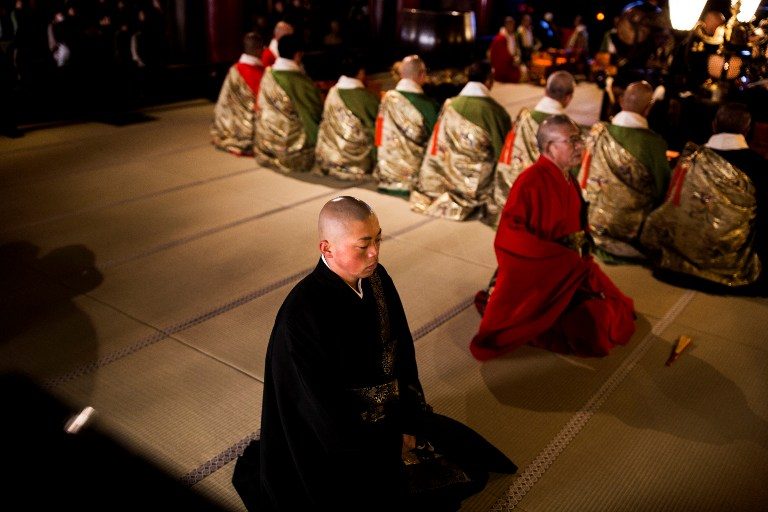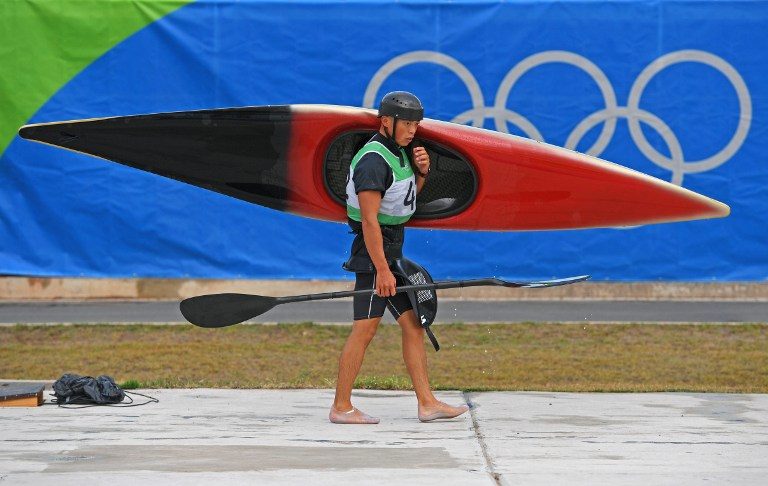SUMMARY
This is AI generated summarization, which may have errors. For context, always refer to the full article.

NAGANO, Japan – Rising silently before dawn to slip on his monastic robes and begin the solemn duties of a Buddhist monk, Kazuki Yazawa is not your average Olympic athlete.
Bowing his shaved head in prayer 5 times a day as part at the ancient Zenkoji Daikanjin Temple, Yazawa is so committed to his faith very few people would recognize him as Japan’s top canoeist.
But Yazawa, who finished 11th in the men’s kayak slalom at the Rio Olympics earlier this year, is contemplating the holy grail of the 2020 Tokyo Games.
“Of course I want to compete in Tokyo,” the 27-year-old told AFP in an interview as the early morning sun crept above the roof of his temple in Nagano prefecture.
“It will be the only chance in my life to compete at an Olympics in Japan,” added Yazawa, who also represented his country at the Beijing and London Games.
“But it’s pretty hard to win an Olympic medal if you also happen to be a monk. To set your heart on winning a medal, you have to be completely focused. Otherwise it’s impossible.”
Still getting to grips with the priesthood’s austere way of life, Yazawa squeezes in kayak training each afternoon, pulling on a T-shirt and shorts before hurtling down a nearby river at breakneck speed.
The fun-loving priest, who frequently posts grinning selfies on Instagram, flirted with retirement after a Japanese record ninth-place finish at the 2012 London Olympics as his thoughts turned to finding a steady job for the future.
Room with a pew
Instead he was persuaded to swap his life as an athlete on the professional circuit for a room with a pew.
“I didn’t have an epiphany – I simply wasn’t interested in becoming a priest,” said Yazawa, who took the advice of the local canoe federation boss Kenei Koyama, himself a priest.

“(But) I really looked up to my teacher (Koyama) and wanted to become like him, someone who will be there to help people.
“Obviously now I don’t have enough time for my kayak training but I get to enjoy the sport in its purest form,” he added. “I still want to win though. That hasn’t changed.”
Yazawa, whose younger sister Aki also qualified for Rio, admits his second calling got off to a difficult start.
“The first two months of monastic training were in the mountains,” he said.
“You wake up at 2:00 am and study until 10:00 am, sat with your legs crossed the whole time. The food is very basic and you have to do the cleaning. It’s tough.”
But while Yazawa can no longer spend as much time in the gym or on the water, he believes he does have divine support.
“I don’t feel that because I’m a priest my kayak goes any faster,” he smiles. “But I do feel that the Buddha is protecting me.
“You must have a goal and dedicate yourself to it. If you do that, then it’s in the last split-second where Buddha will help you,” added Yazawa, who last month captured the Japan Cup.
Holy water
Yazawa says his faith helps make him a better canoeist.
“I don’t do anything particularly religious before I get into the canoe,” he said. “But I believe if I focus hard enough, the Buddha will give me a gentle push on the water.”
His senior monks woke up in the middle of the night to watch live streaming of Yazawa’s races in Rio, further supporting him with text messages and Skype calls.
“We all want him to win a medal at the Tokyo Olympics,” said priest Shinjun Denda. “We will all be cajoling him and pushing him to compete.”
For now religion comes first for Yazawa, who insists he wants to race on his own terms.
“I don’t want to have any regrets,” he said, sitting in front of the temple’s grand altar.
“When you come to a place like this you feel your heart relax. It helps control your feelings when you’re competing under pressure. But if you don’t control your own thoughts, you won’t get any help from above.” – Rappler.com
Add a comment
How does this make you feel?
There are no comments yet. Add your comment to start the conversation.